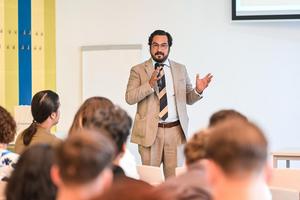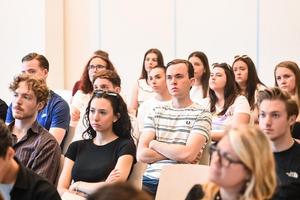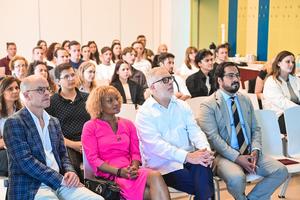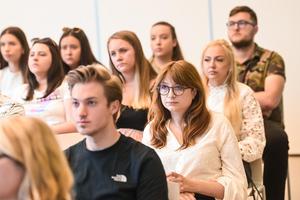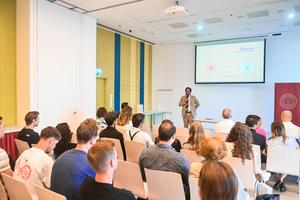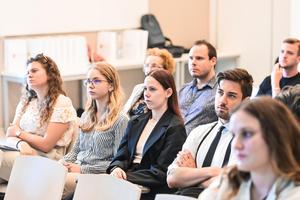The Ludovika University of Public Service (LUPS) Faculty of Public Governance and International Studies organized its first Erasmus+ Blended Intensive Programme (BIP) from May 27 to 31. The international event, titled "Law and Safety in Public Service," was conducted in English and included a week of in-person sessions at the LUPS' Ludovika Campus. Participants included ten LUPS students and several faculty members, along with twenty international students and four instructors from Inholland University of Applied Sciences in Rotterdam and Josip Juraj Strossmayer University of Osijek.
In his opening remarks, Peter Krisztián Zachar, the International Vice Dean of the Faculty, expressed his pleasure at the participants joining the sessions at LUPS and hoped that the event would deepen their understanding of the complex interplay between law, safety, and governance in the public sector. He provided a brief overview of LUPS' history, the faculty, and the doctoral programs, and emphasized that the intensive program offered a comprehensive exploration of key topics shaping the strategic frameworks and responses of the European Union (EU) to contemporary challenges. Participants examined critical areas such as EU strategy, crisis management, internal and external security challenges, and various perspectives on migration.
Led by renowned experts in international relations, the program included discussions on the role of the European Court of Justice in shaping legal and security aspects of public services, as well as the evolving international law concerning modern warfare. Participants gained insights into the pursuit of strategic autonomy within the EU's defense policy and the broader security structure, including the roles of organizations like the Organization for Security and Co-operation in Europe (OSCE) and NATO.
In his welcome address, Pier Paolo Pigozzi, LUPS' Vice-Rector for International Affairs, spoke about the domestic politics of Ecuador, Mexico, Chile, and Colombia, and their differing state structures compared to European countries. He highlighted the ongoing "war" between the Mexican government and drug cartels, noting significant corruption and judicial bias towards the executive power at both state and local levels. Pigozzi emphasized the importance of changing mindsets to value integrity, particularly in these countries, and underscored the crucial role of young people in bringing about change.
The international law scholar highlighted that the Faculty's programs aim to equip graduates with the knowledge to address global issues. He noted that the current event allowed participants to understand the importance of legal traditions and the need to consider the legal values of different communities when formulating and addressing global problems. Pigozzi stressed that the goal of the public sector should be the common good and good governance.
The Erasmus+ Blended Intensive Programme is a mobility initiative combining physical and virtual components, organized for learning purposes and requiring the participation of at least three higher education institutions from three different countries. The BIP represents a new generation of Erasmus+ programs that support blended intensive programs, enabling groups of higher education institutions to jointly develop mobility curricula. The in-person mobility part lasts a minimum of five and a maximum of thirty days, depending on the program, and is carried out in the host partner institution’s country. The virtual component is mandatory and involves online cooperative learning and group work, allowing participants to work together on tasks in real-time in a virtual environment.
The BIP employs various educational methods to promote active participation, critical thinking, and the practical application of knowledge. Instructors and mentors engage participants through interactive lectures that encourage questions, discussions, and real-time polling. Multimedia tools such as videos and interactive simulations enhance the understanding and retention of key concepts. Simulation games and tabletop exercises allow participants to assume specific roles and collaborate on managing simulated crises or strategic challenges.
Text: Zsófia Sallai
Photos: Dénes Szilágyi
